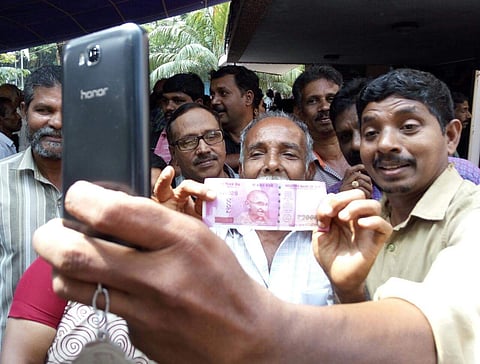

KASARGOD: Billed as a haven for unaccounted money, Kerala's service cooperative banks [SCBs] are unfazed by the mammoth task of converting their bundles of Rs 1,000 and Rs 500 currency notes into fresh legal tender.
Officials said when the SCBs approach the district cooperative banks to exchange their high-denomination notes, they will not have to answer any questions about the source of the money.
"We have already deposited Monday's closing balance with the district cooperative bank to get lower denomination notes," said the manager of an SCB in Manjeshwaram.
A top official of Kerala's Cooperation Department said as per RBI guidelines, cooperative banks need not ask for the source of the money while taking deposits.
But then, the state government issued an order in 2013 asking SCBs to strictly comply with the RBI's Know Your Client [KYC] norms, as per which banks ought to record the client's ID card, PAN card and a duly filled form, which enquires about the source of income.
Also, if the interest payout is more than Rs 10,000, SCBs are required to deduct 10 per cent as tax deducted at source [TDS]. If the customer does not want to be taxed, he or she would have to give a declaration on Form 15 G that says: "I have never come under the purview of the Income Tax Act or my annual income does not come under the purview of the Income Tax Act, 1961."
These declarations are sent to the Income Tax Department, which will verify the claims. Apart from that, SCBs and district cooperative banks have to submit all the details of customers who deposit more than Rs 10 lakh to the IT Department.
But in reality SCBs flout KYC norms, and do not accept Form 15 G. Nor do they send details of the customers who deposit more than Rs 10 lakh, officials said.
"We are classified as a primary agricultural credit society and deposits up to Rs 25 lakh are exempt from tax," said the manager of an SCBs.
When asked about KYC, they admitted that norms were not being followed because SCBs operate in remote areas, and most of their depositors are small-time traders and real estate players. "We have personal relations them. Sometimes, when they sell land, they put the money in our bank. A portion of the money is untaxed. We know that," he said, and added that the business is important to the banks.
Cooperation Department officials admit that SCBs do not stick to KYC norms. "I am not countering the IT department's estimate of Rs 30,000 crore of unaccounted money lying in the cooperative sector," a top official said, but added: "But according to the Department of Cooperation, there is no illegal money in the sector."
He said banks are not able to insist on KYC because of social and political pressure. He said during auditing, he once found Rs 14 crore in one bank account in Kasargod. "I spotted it because the interest outgo was Rs 52 lakh," he said. The account holder was a resident of Mahe and ran an automobile business in Dubai.
But with the new initiatives being taken up by the government, the cooperative sector is likely to clean up its act. "Now all fixed deposit withdrawals are routed through the customer's bank account. That will bring the money into the tax net," he said.